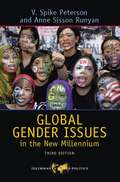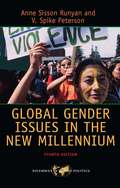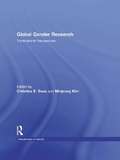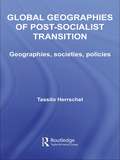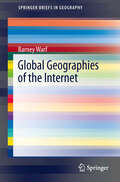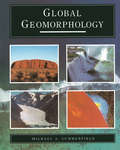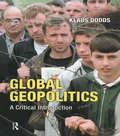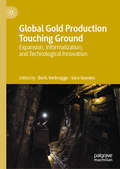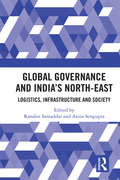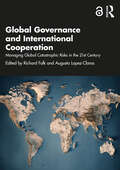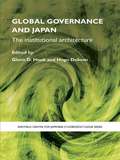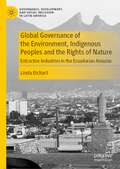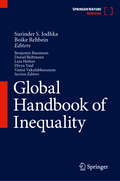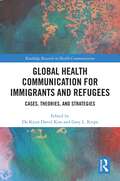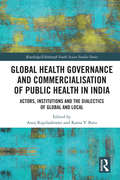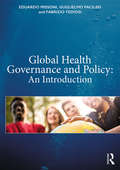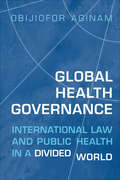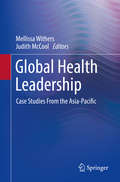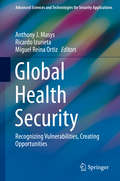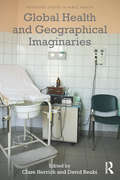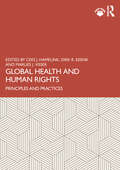- Table View
- List View
Global Gender Issues in the New Millennium
by V. Spike Peterson Anne Sisson RunyanWritten by Peterson (political science, U. of Arizona) and Runyan (women's, gender, and sexuality studies, U. of Cincinnati), this textbook on global gender issues is reflective of the contemporary feminist international relations scholarship typically found in the pages of the International Feminist Journal of Politics as combined with recent work in transnational feminist inquiry more generally. Chapters address: analyzing world politics through a gendered lens, gender and global governance, gender and global security, gender and global political economy, and gendered resistance politics. Annotation ©2009 Book News, Inc. , Portland, OR (booknews. com)
Global Gender Issues in the New Millennium
by V. Spike Peterson Anne Sisson RunyanGlobal Gender Issues in the New Millennium argues that the power of gender works to help keep gender, race, class, sexual, and national divisions in place despite increasing attention to gender issues in the study and practice of world politics. Accessible and student-friendly for both undergraduate and graduate courses, authors Anne Sisson Runyan and V. Spike Peterson analyze gendered divisions of power and resources that contribute to the worldwide crises of representation, violence, and sustainability. They emphasize how hard-won attention to gender equality in world affairs can be co-opted when gender is used to justify or mystify unjust forms of global governance, international security, and global political economy.In the new and updated fourth edition, Runyan and Peterson examine the challenges of forging transnational solidarities to de-gender world politics, scholarship, and practice through renewed politics for greater representation and redistribution. Yet they see promise in coalitional struggles to re-radicalize feminist world political demands to change the downward conditions of women, men, children, and the planet. Updated to include framing questions at the opening of each chapter, discussion questions and exercises at the end of each chapter, and updated data on gender statistics and policymaking. Chapters One and Two have also been revised to provide more support to readers with less of a background in gender politics. Case studies and web resources are now also provided.
Global Gender Issues in the New Millennium
by V. Spike Peterson Anne Sisson RunyanGlobal Gender Issues in the New Millennium connects the inequalities between and among women and men with the world politics of global governance, security, political economy, and ecology. Through historical, theoretical, and empirical analysis, the authors alert us to gendered divisions of power, violence, labor and resources, as well as the power of gender as a meta-lens that keeps gender, race, class, sexual, and national divisions in place, despite some re-positionings of some women and men on the world political stage. In this completely new edition, which reflects significant advances in feminist international relations and transnational feminist scholarship, the authors apply intersectional analysis to global governance, militarization, global economic restructuring, and environmental degradation. They explore how crises of representation, insecurity, and sustainability have widened and deepened--particularly in the post-9/11 period--while at the same time global gender policymaking (quotas, gender mainstreaming, and the advancing of women's human rights) has increased. The authors focus on this apparent contradiction--the higher level of attention to gender and women's human rights in a time of fierce militarization, savage economic inequality, and ecological crisis--but also address how the power of gender, as a meta-lens that orders world politics, can be deconstructed to rethink identities, ideologies, structures, and policies that rest upon gendered processes of imperialism, neoliberalism, racialization, and sexualization. The book emphasizes how hard-won attention to gender equality in world affairs can be co-opted when gender is used to justify or mystify unjust global governance, global security, and global political economy, but at the same time sees promise in coalitional struggles to re-radicalize feminist world political demands to change the downward conditions of women, men, children, and the planet. Thus, the authors also examine the challenges of forging transnational solidarities to de-gender world politics, scholarship, and practice through renewed politics of representation and redistribution.
Global Gender Issues in the New Millennium
by V. Spike Peterson Anne Sisson RunyanGlobal Gender Issues in the New Millennium connects the inequalities between and among women and men with the world politics of global governance, security, political economy, and ecology. Through historical, theoretical, and empirical analysis, the authors alert us to gendered divisions of power, violence, labor and resources, as well as the power of gender as a meta-lens that keeps gender, race, class, sexual, and national divisions in place, despite some re-positionings of some women and men on the world political stage. In this completely new edition, which reflects significant advances in feminist international relations and transnational feminist scholarship, the authors apply intersectional analysis to global governance, militarization, global economic restructuring, and environmental degradation. They explore how crises of representation, insecurity, and sustainability have widened and deepened--particularly in the post-9/11 period--while at the same time global gender policymaking (quotas, gender mainstreaming, and the advancing of women's human rights) has increased. The authors focus on this apparent contradiction--the higher level of attention to gender and women's human rights in a time of fierce militarization, savage economic inequality, and ecological crisis--but also address how the power of gender, as a meta-lens that orders world politics, can be deconstructed to rethink identities, ideologies, structures, and policies that rest upon gendered processes of imperialism, neoliberalism, racialization, and sexualization. The book emphasizes how hard-won attention to gender equality in world affairs can be co-opted when gender is used to justify or mystify unjust global governance, global security, and global political economy, but at the same time sees promise in coalitional struggles to re-radicalize feminist world political demands to change the downward conditions of women, men, children, and the planet. Thus, the authors also examine the challenges of forging transnational solidarities to de-gender world politics, scholarship, and practice through renewed politics of representation and redistribution.
Global Gender Research: Transnational Perspectives (Perspectives on Gender)
by Christine Bose Minjeong KimReaders of Global Gender Research will learn to compare and contrast feminist concerns globally, gain familiarity with the breadth of gender research, and understand the national contexts that produced it. This volume provides an in-depth comparative picture of the current state of feminist sociological gender and women's studies research in four regions of the world—Africa, Asia, Latin America/the Caribbean, and Europe—as represented by many countries. The introductory essay to each region explains how social science research on women and/or gender issues has been shaped by economics, politics, and culture, and by trends that are simultaneously local, regional, and global. It familiarizes readers with the wide range of salient issues, research methods, writing styles, and leading authors from around the globe. Each regional section includes several chapters on gender research in specific countries that represent the region's diversity and cover the major theoretical and empirical trends that have emerged over time, as well as the relationship of key research questions to feminist activism and women’s or gender studies. Next, the editors illustrate this new wave of gender scholarship with translated/reprinted samples of research articles from additional countries in the region, that cover a wide range of important global topics—such as work, sexuality, masculinities, childcare and family issues, religion, violence, law and gender policies. Finally, this volume provides scholars with extensive bibliographies and a listing of web sites for women’s and gender research centers in 85 countries.
Global Geographies of Post-Socialist Transition: Geographies, societies, policies (Routledge Studies in Human Geography)
by Tassilo HerrschelSince the formal raising of the Iron Curtain, there has been much interest in post-socialism and the process of post-socialist transition. This timely book provides a systematic review and analysis of the process of ‘transition’. Herrschel: explores recent theories, concepts and debates on post-socialism and the notion of transition provides a systematic, topical account of post-socialist transitions around the world, as evidence by social, economic, and political processes examines case studies of post-socialist transition in east and Central Europe, the former Soviet Union, Asia and South-East Asia, and Africa and Latin America brings together theoretical and practical aspects by examining what lessons can be learned from recent experiences. Global Geographies of Post-Socialist Transition provides a truly global comparative account of the meaning and processes of post-socialist transition and will be an invaluable resource for all those interested in this area.
Global Geographies of the Internet
by Barney WarfToday, roughly 2 billion people use the internet, and its applications have flourished in number and importance. This volume will examine the growth and geography of the internet from a political economy perspective. Its central motivation is to illustrate that cyberspace does not exist in some aspatial void, but is deeply rooted in national and local political and cultural contexts. Toward that end, it will invoke a few major theorists of cyberspace, but apply their perspectives in terms that are accessible to readers with no familiarity with them. Beyond summaries of the infrastructure that makes the internet possible and global distributions of users, it delves into issues such as the digital divide to emphasize the inequalities that accompany the growth of cyberspace. It also addresses internet censorship, e-commerce, and e-government, issues that have received remarkably little scholarly attention, particularly from a spatial perspective. Throughout, it demonstrates that in cyberspace, place matters, so that no comprehensive understanding of the internet can be achieved without considering how it is embedded within, and in turn changes, local institutional and political contexts. Thus the book rebuts simplistic "death of distance" views or those that assert there is, or can be, a "one-size-fits-all, cookie-cutter" model of the internet applicable to all times and places.
Global Geomorphology
by Michael A. SummerfieldThe plate tectonics revolution in the earth sciences has provided a valuable new framework for understanding long-term landform development.This innovative text provides a comprehensive introduction to the subject of global geomorphology, with the emphasis placed on large-scale processes and phenomena. Integrating global tectonics into the study of landforms and incorporating planetary geomorphology as a major component the author discusses the impact of climatic change and the role of catastrophic events on landform genesis and includes a comprehensive study of surface geomorphic processes.
Global Geopolitics: A Critical Introduction
by Klaus J. DoddsEmploying thematic investigation and illustrated through case studies, Dodds explores how global politics is imagined and practised by countries such as the US and other organisations including Greenpeace, the IMF and CNN International.In addition, the author discusses how issues such as environmental degradation, terror networks, anti-globalisation protests and North-South relations challenge, consolidate and subvert the existing international political system.
Global Gold Production Touching Ground: Expansion, Informalization, and Technological Innovation
by Sara Geenen Boris VerbruggeIn recent decades, gold mining has moved into increasingly remote corners of the globe. Aside from the expansion of industrial gold mining, many countries have simultaneously witnessed an expansion of labor-intensive and predominantly informal artisanal and small-scale gold mining. Both trends are usually studied in isolation, which contributes to a dominant image of a dual gold mining economy. Counteracting this dominant view, this volume adopts a global perspective, and demonstrates that both industrial gold mining and artisanal and small-scale gold mining are functionally integrated into a global gold production system. It couples an analysis of structural trends in global gold production (expansion, informalization, and technological innovation) to twelve country case studies that detail how global gold production becomes embedded in institutional and ecological structures.
Global Goods and the Spanish Empire, 1492–1824
by Bartolomé Yun-Casalilla Bethany AramDrawing upon economic history, cultural studies, intellectual history and the history of science and medicine, this collection of case studies examines the transatlantic transfer and transformation of goods and ideas, with particular emphasis on their reception in Europe.
Global Governance and India’s North-East: Logistics, Infrastructure and Society
by Ranabir Samaddar Anita SenguptaThis book maps the convergence of governance and connectivity within Asia established through the spatial dynamics of trade, capital, conflict, borders and mobility. It situates Indian trade and governance policies within a broader Asian and global context. Focussing on India’s North-East, in particular on India’s Look and Act East Policy, the volume underscores how logistical governance in the region can bring economic and political transformations. It explores the projected development of the North-East into a gateway of transformative cultural interaction among people, just as the Silk Road became a conduit for Buddhism to travel along with musical instruments and tea. Comprehensive and topical, this book will be useful for scholars and researchers of political studies, international relations, governance studies, development studies, international trade and economics and for think tanks working on South and Southeast Asia.
Global Governance and International Cooperation: Managing Global Catastrophic Risks in the 21st Century
by Augusto Lopez-Claros Richard FalkThe Global Governance Forum and the Global Challenges Foundation collaborate in this collection in their concern that the UN Charter and the contemporary infrastructure for international cooperation are no longer fit for purpose and lack the instruments, resources and legitimacy to address the catastrophic risks threatening our future.Twenty-eight contributors offer thoughtful proposals for reforming existing international institutions and creating new ones to build a more peaceful, prosperous and just world, covering themes such as the management of weapons of mass destruction, collective security arrangements, justice and equity in economics, human rights, migration and refugees, climate mitigation, and food security, all bearing on the health of both people and planet.The vital project of this century is building institutions that will underpin global governance in coming decades, requiring imagination, persistence, empathy, and confidence that we will find a path to enhanced mechanisms of binding international law and the resources to make that happen. The volume is essential reading for scholars and researchers on international politics and public policy and indispensable for diplomats and government agencies.
Global Governance and Japan: The Institutional Architecture (The University of Sheffield/Routledge Japanese Studies Series)
by Glenn D. Hook Hugo DobsonLeading specialists from Europe and Japan examine the institutional mechanisms of governance at the global level and provide concrete evidence of the role Japan plays in these institutions. An excellent introduction to the concept of global governance, the volume analyzes how global governance actually works through the global institutional mechanisms of governance. It provides an up-to-date and contemporary analysis of the six most important global institutions, namely: the Group of 7/8 the Organisation for Economic Cooperation and Development the World Bank the International Monetary Fund the World Trade Organization the United Nations. Written clearly and concisely, the book provides a thorough and accessible discussion on Japan’s role within these institutions and uses supporting case studies to ask whether Japan is reactively or proactively involved in trying to shape these institutions in order to promote its own interests. As such, it will be a valuable resource for undergraduates and scholars with an interest in global governance, Japanese politics and political economy.
Global Governance of the Environment, Indigenous Peoples and the Rights of Nature: Extractive Industries in the Ecuadorian Amazon (Governance, Development, and Social Inclusion in Latin America)
by Linda EtchartThis book explores the obstacles facing indigenous communities, non-governmental organizations, governments, and international institutions in their attempts to protect the cultures of indigenous peoples and the world’s remaining rainforests.Indigenous peoples are essential as guardians of the world’s wild places for the maintenance of ecosystems and the prevention of climate change. The Amazonian/Andean indigenous philosophies of sumac kawsay/suma qamaña (buen vivir) were the inspiration for the incorporation of the Rights of Nature into the Ecuadorian and Bolivian constitutions of 2008 and 2009. Yet despite the creation of the United Nations Permanent Forum on Indigenous Issues (2000), and the adoption of the United Nations Declaration on the Rights of Indigenous Peoples (2007), indigenous peoples have been marginalized from intergovernmental environmental negotiations. Indigenous environment protectors’ lives are in danger while the Amazon rainforests continue to burn.By the third decade of the 21st century, the dawn of “woke” capitalism was accompanied by the expansion of ethical investment, with BlackRock leading the field in the “greening” of investment management, while Big Oil sought a career change in sustainable energy production. The final chapters explain the confluence of forces that has resulted in the continued expansion of the extractive frontier into indigenous territory in the Amazon, including areas occupied by peoples living in voluntary isolation.Among these forces are legal and extracurricular payments made to individuals, within indigenous communities and in state entities, and the use of tax havens to deposit unofficial payments made to secure public contracts. Solutions to loss of biodiversity and climate change may be found as much in the transformation of global financial and tax systems in terms of transparency and accountability, as in efforts by states, intergovernmental institutions and private foundations to protect wild areas through the designation of national parks, through climate finance, and other “sustainable” investment strategies.
Global Guyana: Shaping Race, Gender, and Environment in the Caribbean and Beyond
by Oneka LaBennettExposes the global threat of environmental catastrophe and the forms of erasure that structure Caribbean women’s lives in the overlooked nation of GuyanaPreviously ranked among the hemisphere’s poorest countries, Guyana is becoming a global leader in per capita oil production, a shift which promises to profoundly transform the nation. This sea change presents a unique opportunity to dissect both the environmental impacts of modern-world resource extraction and the obscured yet damaging ways in which intersectional race and gender formations circumscribe Caribbean women’s lives.Drawing from archival research and oral history, and examining mass-mediated flashpoints across the African and Indian diasporas—including Rihanna’s sonic routes, ethnic conflict reportage, HBO’s Lovecraft Country, and Netflix’s Indian Matchmaking—Global Guyana repositions this marginalized nation as a nexus of social and economic activity which drives popular culture and ideas about sexuality while reshaping the geopolitical and literal topography of the Caribbean region. Oneka LaBennett employs the powerful analytic of the pointer broom to disentangle the symbiotic relationship between Guyanese women’s gendered labor and global racial capitalism. She illuminates how both oil extraction and sand export are implicated in a well-established practice of pillaging the Caribbean’s natural resources while masking the ecological consequences that disproportionately affect women and children.Global Guyana uncovers how ecological erosion and gendered violence are entrenched in extractive industries emanating from this often-effaced but pivotal country. Sounding the alarm on the portentous repercussions that ambitious development spells out for the nation’s people and its geographical terrain, LaBennett issues a warning for all of us about the looming threat of global environmental calamity.
Global Handbook of Inequality
by Boike Rehbein Surinder S. JodhkaThis handbook provides the most up-to-date and comprehensive review of the literature on inequality. It provides comprehensive overviews of the main theoretical traditions, concepts, dimensions, methodologies and contemporary debates around inequality as well as outlines of the situation of inequality in the world regions. Each entry covers the most relevant literature on the respective topic and gives an introduction to the key discussions. This authoritative reference work includes contributions from established and upcoming scholars based all over the world, and is truly global in perspective. It serves as a first introduction to the study of a particular field or issue related to inequality. The distinctive aspect of this handbook is its emphasis on the lived realities of inequality, its relational and cultural aspects, as well as the economic and quantitative aspects. This is a must-read reference volume for students, researchers and professionals interested in thistopic across the spectrum of the social sciences.
Global Health Communication for Immigrants and Refugees: Cases, Theories, and Strategies (Routledge Research in Health Communication)
by Do Kyun David KimThis book analyzes international cases of immigrants and refugees from a health communication perspective, providing theoretical frames and effective recommendations for designing future health communication campaigns and interventions for health promotion. Internationally renowned scholars elucidate the reality of health communication situations that immigrants and refugees experience in host countries around the globe and examine how national and global health risk situations, including the COVID-19 pandemic, affect immigrant and refugee health during difficult health circumstances. Offering effective health communication strategies for promoting immigrant and refugee health, the book also provides lessons learned from past and present health communication campaigns, responses of diverse communities, and governmental policies. Drawing on case studies from major host countries on different continents, this book will be of interest to anyone researching or studying in the areas of health communication, public health, international relations, public administration, nursing, and social work.
Global Health Governance and Commercialisation of Public Health in India: Actors, Institutions and the Dialectics of Global and Local (Routledge/Edinburgh South Asian Studies Series)
by Anuj Kapilashrami Rama V. BaruGlobal health governance has been the subject of wide scholarship, more recently brought to the fore by priorities for global health defined by the Sustainable Development Agenda. The health landscape itself has changed dramatically in the last two decades, shaped by cross-border flows of capital, ideas, technology intermediated through the complex interaction between global, national and local actors and institutions. This book analyses the complex terrain of global health governance and local responses to new global forms of integration and fragmentation in India. It unpacks, both conceptually and empirically, local manifestation and translation of global health architecture and regimes and how these processes influence public health policy and practice; as well as to what extent rules and flows are complied with, resisted and transformed at national and sub-national levels. Drawing together critical scholarship on interactions between global and local actors, focusing on processes, dilemmas, conflicts and trade-offs that such engagement presents for national health policies and health systems, it speaks to this interface between the global, national and local. Filling an important gap in global health governance scholarship in India, the book is a useful contribution to the fields of global health policy, international health and development, health systems, health inequalities, public health, public administration, development studies, social work, nursing, management studies and mainstream social science disciplines that engage with globalisation and health.
Global Health Governance and Policy: An Introduction
by Eduardo Missoni Guglielmo Pacileo Fabrizio TediosiGlobal Health Governance and Policy outlines the fundamentals of global health, a key element of sustainable development. Taking an interdisciplinary approach, it explores the relationship between the globalization process and global health’s social, political, economic and environmental determinants. It points the attention to the actors and forces that shape global policies and actions with an impact on peoples’ health in an increasingly complex global governance context. Topics discussed include: The relationship between globalization and the determinants of health The essentials of global health measurements The evolution of public health strategies in the context of the global development agenda The actors and influencers of global health governance The role of health systems The dynamics and mechanisms of global health financing and Development Assistance for Health Career opportunities in global health governance, management and policy Looking in depth at some of the more significant links between neoliberal globalization, global policies and health, Global Health Governance and Policy: An Introduction discusses some specific health issues of global relevance such as changes in the ecosystem, epidemics and the spread of infectious diseases, the global transformation of the food system, the tobacco epidemic, human migration, macroeconomic processes and global financial crisis, trade and access to health services, drugs and vaccines, and eHealth and the global "health 4.0" challenge. Written by a team of experienced practitioners, scientists and teachers, this textbook is ideal for students of all levels and professionals in a variety of disciplines with an interest in global health.
Global Health Governance: International Law and Public Health in a Divided World
by Obijiofor AginamGlobalization has immersed all of humanity in a single germ pool. There are no health sanctuaries in a globalizing world. In Global Health Governance, Obijiofor Aginam explores the relevance of international law in contemporary public health diplomacy. He focuses on the concept of mutual vulnerability to explore the globalization of disease, in what is paradoxically a global village and a divided world. Drawing from a wide range of disciplines, Global Health Governance offers a holistic approach to global health governance involving a multiplicity of actors: nation-states, international organizations, civil society organizations, and private actors. Aginam articulates modest proposals under the rubric of communitarian globalism, a paradigm that strives to meet the ideals of 'law of humanity.' These proposals project a humane global health order where all of humanity is inexorably tied into a global compact and where the health of one nation-state rises and falls with the health of others. International law—with its bold claims to universal protection of human rights and human dignity—is an indispensable governance tool for the reconstruction of damaged public health trust in the relations of nations and peoples.
Global Health Leadership: Case Studies From the Asia-Pacific
by Mellissa Withers Judith McCoolThis timely book serves as an overview of the challenges in global health leadership from multiple perspectives, bringing together an interdisciplinary group of academics, researchers, and leaders from around the world who are conducting innovative and high-quality research in the field of global health (GH). The book helps illustrate theoretical and conceptual ideas of leadership using recent examples of GH challenges from the Asia-Pacific region.Leadership is an important element of education and training in GH. Leadership can be demonstrated by many sectors, including local and national government, intergovernmental and non-governmental organizations, multilateral organizations, civil society, and private individuals and corporations. The cases included in this book provide an analysis of the major components to successful efforts in GH, including cooperation, cultural competency, vision, and community ownership.Given that GH practice is typically conducted in team settings with members from various backgrounds, this book provides students, faculty, and professionals in public health and related fields with an opportunity to examine multiple examples of leadership in different contexts. Readers learn how leaders have overcome challenges faced in the operationalization of complex health interventions, foreign policy, and working with key stakeholders and organizations.This book aims to help students to:Identify key trends and issues working in GH contexts;Analyze situations in GH and explain the ways public health, health care, and other organizations can work together or individually to affect the health of a community;Recognize the ways that diversity influences policies, programs, services, and the health of a community;Support diverse perspectives in developing, implementing, and evaluating policies, programs, and services that affect the health of a community;Identify characteristics of GH leaders;Learn about ways to identify and measure success in leadership; andUnderstand the challenges and barriers faced in GH programs and how to overcome those.
Global Health Security: Recognizing Vulnerabilities, Creating Opportunities (Advanced Sciences and Technologies for Security Applications)
by Anthony J. Masys Ricardo Izurieta Miguel Reina OrtizWith our highly connected and interdependent world, the growing threat of infectious diseases and public health crisis has shed light on the requirement for global efforts to manage and combat highly pathogenic infectious diseases and other public health crisis on an unprecedented level. Such disease threats transcend borders. Reducing global threats posed by infectious disease outbreaks – whether naturally caused or resulting from a deliberate or accidental release – requires efforts that cross the disaster management pillars: mitigation, preparedness, response and recovery. This book addresses the issues of global health security along 4 themes: Emerging Threats; Mitigation, Preparedness, Response and Recovery; Exploring the Technology Landscape for Solutions; Leadership and Partnership. The authors of this volume highlight many of the challenges that confront our global security environment today. These range from politically induced disasters, to food insecurity, to zoonosis and terrorism. More optimistically, the authors also present some advances in technology that can help us combat these threats. Understanding the challenges that confront us and the tools we have to overcome them will allow us to face our future with confidence.
Global Health and Geographical Imaginaries
by Clare Herrick David ReubiTo date, geography has not yet carved out a disciplinary niche within the diffuse domain that constitutes global health. However, the compulsion to do and understand global health emerges largely from contexts that geography has long engaged with: urbanisation, globalisation, political economy, risk, vulnerability, lifestyles, geopolitics, culture, governance, development and the environment. Moreover, global health brings with it an innate, powerful and politicising spatial logic that is only now starting to emerge as an object of enquiry. This book aims to draw attention to and showcase the wealth of existing and emergent geographical contributions to what has recently been termed ‘critical global health studies’. Geographical perspectives, this collection argues, are essential to bringing new and critical perspectives to bear on the inherent complexities and interconnectedness of global health problems and purported solutions. Thus, rather than rehearsing the frequent critique that global health is more a ‘set of problems’ than a coherent disciplinary approach to ameliorating the health of all and redressing global bio-inequalities; this collection seeks to explore what these problems might represent and the geographical imaginaries inherent in their constitution. This unique volume of geographical writings on global health not only deepens social scientific engagements with health itself, but in so doing, brings forth a series of new conceptual, methodological and empirical contributions to social scientific, multidisciplinary scholarship.
Global Health and Human Rights: Principles and Practices
by Cees J. Hamelink Dirk R. Essink Marlies J. VisserThis textbook explores public health and individual health care through the prism of global human rights and ethical decision-making.Written by leading experts in this field, the book is divided into three distinctive parts. Part I introduces the theoretical framework through which the core issues can be understood, contrasting a clinical approach to health care with a social determinant perspective and discussing the decolonialisation of global health. Part II discusses how a human rights rationale impacts different social groups, from children to the elderly to those with disabilities, highlighting issues such as abortion and euthanasia. Part III addresses contemporary topics such as infectious diseases, migration, mental health care, the impact of advanced medical technology and climate change. Each chapter features case studies which ask readers to assess complex ethical dilemmas, fostering decision-making based on clear moral reasoning, as well as discussion assignments and further reading.Also featuring online video lectures, this is an important textbook that will be essential reading for students across the health sciences, including medicine and all related fields.
